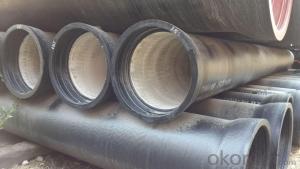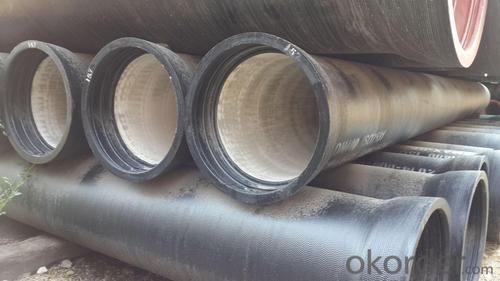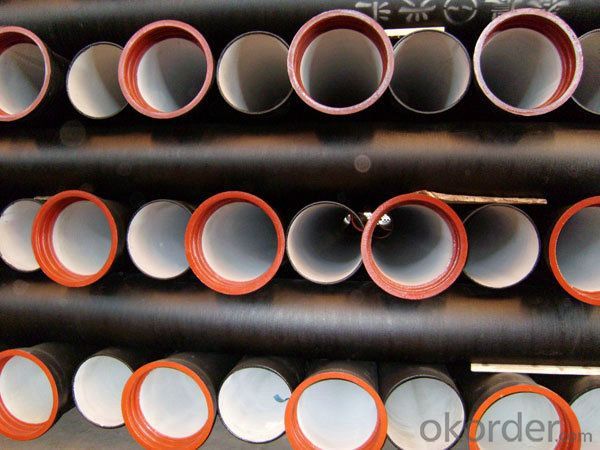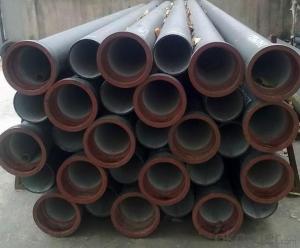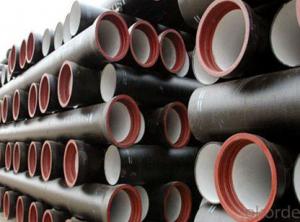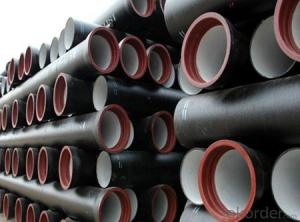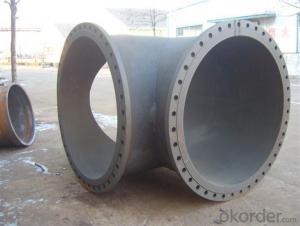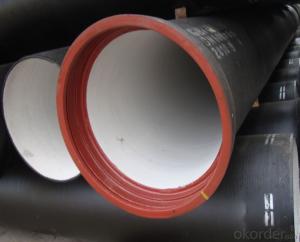Ductile Iron Pipe of China Class BS EN598
- Loading Port:
- China main port
- Payment Terms:
- TT or LC
- Min Order Qty:
- 1000 m
- Supply Capability:
- 500000 m/month
OKorder Service Pledge
OKorder Financial Service
You Might Also Like
1. Ductile Iron Pipe Description :
It has high strength & hardnes as steel and better corrosin resistance than steerl and grey iron, I ductile iron pipe is the ideal substute for gray cast iron pipe and common steel pipe. In addition, our DI pipes are produced with good straightness, identical wall thickness, high dimension accuracy, smooth surface finished, remarkable mechanical properties and firmly sticking internal & external coating layer as well. Flexible Push-in joint and rubber gasket are used for more convenient installation of pipelines.
2. Ductile Iron Pipe Main Features:
- For potable water supply
- High strength
- Long lifespan
- Good corrosion resistance
- Easy installation
3.Ductile Iron Pipe Images:
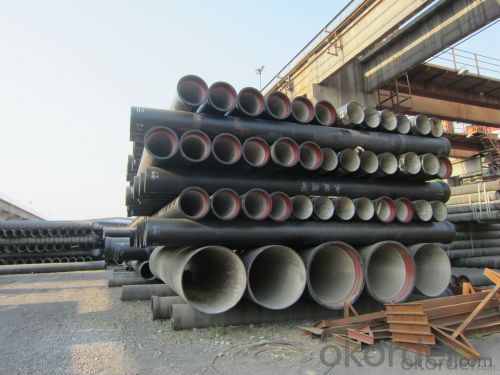
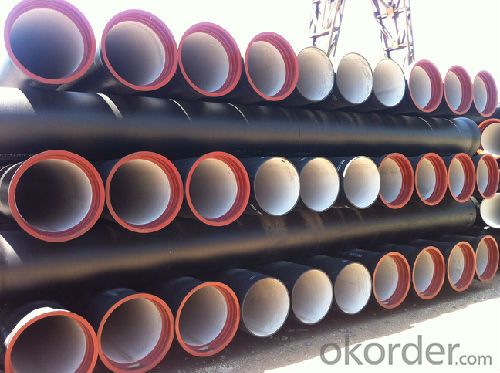
4.Ductile Iron Pipe Specification:
1) The standard of pipe: ISO2531:1998, K9
2) Effective length: 6m
3) Inner cement line: Portland cement line as per ISO4179
4) Zinc coating: at least 130g/m2 as per ISO8179
5) Bitumen painting: at least 70um as per ISO8179
6) With 100% quantity of NBR ring, or SBR ring, or EPDM ring as per ISO4633
7) DN80mm-800mm
8) High strength, lighter than grey iron, good corrosion resistance, no furring, small flow resistance, easy fixing, long life tome about 100 yeas
5.FAQ:
Here some questions always been asked
1.For Price CIF CFR FOB CPT and so on both ok for us
2.For Delivery we must try us best to send goods to you asap
3.For Package all standard seaworthy package
4.For Payment, T/T L/C which convenience for you will be ok
- Q: How are ductile iron pipes installed?
- Typically, the installation of ductile iron pipes follows a specific process. Firstly, the required depth and width of the trench are excavated. Careful leveling and compaction of the trench's bottom then establish a stable foundation. Next, a bedding material, usually a mixture of sand and gravel, is placed at the trench's bottom. This material supports the pipe and distributes the load evenly, while also safeguarding it from any sharp objects in the soil. Once the bedding is prepared, the ductile iron pipes are gently lowered into the trench and aligned as desired. Proper alignment and the correct slope are essential for efficient water flow. Subsequently, the pipes are joined together using either a mechanical joint or a push-on joint system. These joints are designed to create a secure, leak-free connection between the pipes. Rubber gaskets are typically used to seal the joints and establish a watertight seal. After joining the pipes, the trench is backfilled with the excavated soil. Care is taken to compact the soil in layers to prevent settlement. The backfilling process is typically carried out in stages to ensure proper compaction. Lastly, the installation is completed by connecting the ductile iron pipes to the existing water supply system or other pipes using appropriate fittings and valves. Pressure testing may also be conducted to verify the installation's integrity. In conclusion, the installation of ductile iron pipes necessitates meticulous planning, precise alignment, and secure jointing to establish a durable and dependable water supply system.
- Q: What is the weight of ductile iron pipes compared to other materials?
- Ductile iron pipes are generally heavier than other commonly used materials such as PVC or HDPE pipes.
- Q: Can ductile iron pipes be used for oil and gas pipelines?
- Yes, ductile iron pipes can be used for oil and gas pipelines. Ductile iron is known for its durability, strength, and corrosion resistance, making it suitable for transporting oil and gas. Its high tensile strength and ability to withstand pressure and extreme temperatures make it a reliable choice for these applications.
- Q: How do ductile iron pipes handle ground movement or settlement?
- Ductile iron pipes are known for their exceptional strength and flexibility, which allows them to handle ground movement or settlement effectively. Ground movement or settlement refers to the natural shifting or settling of the earth's surface, which can put stress on underground infrastructure like pipes. When it comes to ground movement, ductile iron pipes have the advantage of being able to withstand and absorb the pressure and movement caused by the shifting soil. The ductility of the material allows the pipes to flex and bend to a certain degree without breaking. This flexibility helps to distribute the load and minimize the potential for damage. Moreover, ductile iron pipes have a high resistance to cracking or fracturing, even under extreme conditions. This resilience is due to the unique microstructure of the material, which provides excellent tensile strength and impact resistance. As a result, ductile iron pipes can withstand external forces and ground settlement without compromising their integrity. To further enhance their ability to handle ground movement or settlement, ductile iron pipes are often installed using flexible joints. These joints allow for slight movement and accommodate any shifting or settling of the ground. Additionally, proper bedding and backfilling techniques are employed during installation to provide additional support and stability. Overall, ductile iron pipes have a proven track record in handling ground movement or settlement. Their strength, flexibility, and resistance to cracking make them a reliable choice for underground infrastructure, ensuring the longevity and efficiency of water distribution systems.
- Q: What is the relationship between the mechanical properties of spheroidal graphite cast iron and its spheroidization rate?
- Grade high good, mechanical performance can reach or exceed the standard, the grade is not high, the performance can not be achieved
- Q: What is the typical wall thickness of ductile iron pipes?
- The wall thickness of ductile iron pipes can vary depending on their size and intended use, with a typical range of 0.25 inches (6.35 mm) to 0.5 inches (12.7 mm). However, when dealing with larger diameter pipes or those meant for high-pressure applications, the wall thickness may exceed these measurements. To determine the suitable wall thickness for a ductile iron pipe, it is crucial to refer to industry standards and project specifications.
- Q: Do ductile iron pipes require cathodic protection?
- Indeed, cathodic protection is necessary for ductile iron pipes. Employing this technique safeguards metallic structures against corrosion by designating them as the cathode in an electrochemical cell. Ductile iron pipes face a high susceptibility to corrosion, particularly in harsh soil environments or when exposed to water that harbors substantial amounts of corrosive elements like chlorides or sulfates. By subjecting the pipe to a direct electrical current, cathodic protection effectively thwarts the innate corrosion process. This approach guarantees the durability and soundness of the ductile iron pipes, thereby diminishing the frequency of repairs or replacements.
- Q: Can ductile iron pipes be used in areas with high soil acidity and alkalinity?
- Ductile iron pipes can generally be used in areas with high soil acidity and alkalinity. However, it is important to consider the specific conditions and take appropriate measures to mitigate the potential effects of these soil characteristics on the pipes. In areas with high soil acidity, the acidic conditions can promote corrosion of metal pipes, including ductile iron. To prevent this, protective measures such as applying an external coating or using cathodic protection can be implemented. These measures help to create a barrier between the pipe and the corrosive environment, extending the longevity of the pipes. Similarly, in areas with high soil alkalinity, the alkaline conditions can also have an impact on the performance of ductile iron pipes. Alkaline soils can cause the formation of calcium carbonate deposits, commonly known as scale, which can reduce the flow capacity of the pipes over time. Regular maintenance and cleaning of the pipes can help mitigate the effects of scale buildup. It is worth noting that the suitability of ductile iron pipes in areas with high soil acidity and alkalinity may also depend on the specific grade and quality of the pipes. Manufacturers often provide guidelines and recommendations regarding the use of their products in various environmental conditions. It is advisable to consult with pipe manufacturers or industry experts to ensure proper selection and installation of ductile iron pipes in such areas.
- Q: Disadvantages of ductile iron pipes
- Compared with cast iron, ductile iron has an absolute advantage in strength. The tensile strength of ductile iron is 60K, while the tensile strength of cast iron is only 31k. The yield strength of ductile iron is 40K, while the cast iron does not show yield strength, and eventually breaks. The strength to cost ratio of ductile iron is far superior to that of cast iron.
- Q: Are ductile iron pipes resistant to sulfuric acid corrosion?
- Yes, ductile iron pipes are generally resistant to sulfuric acid corrosion due to their corrosion-resistant coatings and high chemical resistance.
Send your message to us
Ductile Iron Pipe of China Class BS EN598
- Loading Port:
- China main port
- Payment Terms:
- TT or LC
- Min Order Qty:
- 1000 m
- Supply Capability:
- 500000 m/month
OKorder Service Pledge
OKorder Financial Service
Similar products
Hot products
Hot Searches
Related keywords
